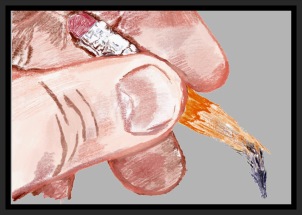By Julian Richardson
The shuttle cleared the ridge and I caught a glimpse of my new home, the Art Colonies of Centauri Alpha. Tucked into the edge of a crater, the biodomes glittered in the sunlight like a pair of tiny glass eggs, washed up on an alien shore by the great wave of human history.
The shuttle banked hard, burning off speed as it came in to land. The cabin filled with the roar of the engines and the view from the portholes turned to fire. I crossed myself and prayed for a safe landing.
The PA system crackled to life. “Sculptors, ceramicists: follow the signs to Dome A. Writers, musicians: follow the signs to Dome B.”
#
The musicians needed space to practice, and a stage for their nightly concerts. The writers needed silence. Nobody could remember why these two groups had been put together, but everybody agreed it had been a really dumb idea. Two weeks after their arrival, the musicians commandeered the only shuttle and headed back to Earth. Leaving the colony was no longer an option, but at least we had peace to work.
#
The rustle of frantic scribbling filled the dome. Computers, like all electronics, were banned in the colonies. Without their distraction, I worked as never before. In fourteen days, I finished the first draft of a novel. A week later I completed a volume of poetry, inspired by the stars which shone at night through the dome’s glass roof, like diamonds in a bed of black velvet.
The sculptors and ceramicists complained of the smell in their dome. A month after our arrival the problem came to a head. I visited an elderly ceramicist who had been evacuated to the colonies’ shared medical facility. Her breathing was a shallow rasp, like leaves in the wind. “The air is poison,” she wheezed, “the air…” Her voice trailed off and she slipped into unconsciousness. I left as the priest was administering the last rites.
The old woman’s words haunted me. Unable to sleep, I sat at my desk at the edge of the dome, waiting for the glory of a twin Centauri Alpha sunrise. In the west, the stars still burned brightly. In the east, the sky slowly lightened, from black to violet to purple. The fuzz of a comet’s tail rose over the silhouette of the sculptors’ dome. I watched the tail lengthen, waiting for the comet’s head to show. Instead, a smudge of orange came into view. I gasped: I had never seen a comet with such a colored nucleus. As it grew, its hue deepened from rose to blood red. I realized to my horror that it was not a comet. It was a fire.
The massive safety doors slammed shut, trapping the sculptors.
“Help me!” cried a voice over the PA system, “Save my work! Save–“. The line was cut.
The sculptors’ dome burned that night. In the morning, all that was left was a thick sheet of glass, the sculptors’ work embedded within it, twisted and melted by the heat.
#
 We formed a committee to study the safety of the dome. The report was devastating: the ink from our pens was poisoning the atmosphere, just as the ceramicists’ glazes had poisoned theirs. By unanimous vote, all pens were destroyed. Each writer was allotted two pencils.
We formed a committee to study the safety of the dome. The report was devastating: the ink from our pens was poisoning the atmosphere, just as the ceramicists’ glazes had poisoned theirs. By unanimous vote, all pens were destroyed. Each writer was allotted two pencils.
Much was written in the following days: on the deaths of the sculptors, the beauty of the sunset, the stars, the comet, the loneliness, the longing for home.
My fingers bled as I tried to write with the tiny nub of my last pencil. When that was gone I found three wax phonographs which I melted into tablets, but these were barely enough for one short story.
When the air did not improve, we ran more tests. It was not just the ink which was poisoning the air: it was the paper too. Even the wax emitted noxious gases. The committee resolved unanimously: in seven days all paper, all wax tablets, would be destroyed.
Each of us was assigned a great work to memorize: The Odyssey, Macbeth, Jane Eyre. We gathered at the appointed time and watched the books burn, our faces lit brightly by the red glow of the incinerator’s fire.
The books are gone. We are left with this: the oral tradition. We convene nightly in the dome to recite the ancient works, and the new ones we have composed, a small band, gathered together, telling our stories under the stars.
Julian D C Richardson was born in London, and recently returned to live there after sixteen years in California. When he is not working as an AI researcher, he writes science fiction and makes pots. In 2018 he attended the Speculative Fiction Writing Workshop at the Gunn Center for the Study of Science Fiction. Previous work has been published in Daily Science Fiction. He blogs sporadically at glowseed.com/mindmash
